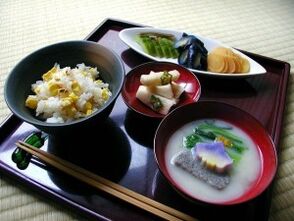The Japanese diet was created in one of the diet clinics in this country.
The authors of this system claim that it completely affects the metabolism of the human body, after which the lost extra kilograms do not return for at least two years.
Basic principles of Japanese diet

A prerequisite for the use of the Japanese diet is the complete rejection of all kinds of alcohol, the prohibition of the use of salt and sugar, flour products and confectionery.
A certain diet plan, designed for two weeks, should be strictly adhered to: throughout these days it is necessary to consistently adhere to the proposed menu.
The authors of the diet believe that deviating from the diet can change the metabolism in unnecessary directions. One of the conditions of the Japanese diet is to drink one and a half liters of ordinary water daily.
Here is an example of the first day according to the proposed Japanese diet menu:
- Breakfast - coffee;
- Lunch - a few eggs with the juice of one tomato or 200 g of tomato, fresh cabbage salad;
- Dinner - fish, 200 g and cabbage salad.
Even from this example it can be seen that the diet is not at all ordinary Japanese cuisine. In Japan, carbohydrates are preferred, mainly in the form of grains, and many seafood, vegetables and fruits are also eaten. According to many doctors, it is this diet that ensures the Japanese a long life.
The 14-day menu in the Japanese diet pays very little attention to carbohydrates, which are the main source of energy, which means that the body, in search of new ways of getting food, will start consuming the protein supplies that are available. In muscle tissue.
As a result, not fat but muscle tissue is lost. The situation does not change even with increased protein intake, which puts extra strain on the kidneys.
Menu for 14 days
Პirveli:
- Breakfast - coffee, one cup.
- Lunch - two eggs, cabbage salad with butter, tomato juice.
- Dinner - fish with olive oil.
Second:
- Breakfast - coffee and brown bread.
- Lunch - fish 200 gr.
- Dinner - 100 g of boiled beef with a glass of yogurt.
ამეThird:
- Breakfast - coffee with crackers.
- Lunch - zucchini, fried in slices of oil.
- Dinner - two boiled eggs, cabbage salad, 150 g of boiled beef.
Fourth:
- Breakfast is coffee.
- Lunch - hard boiled eggs, 3-4 pieces of boiled carrots, olive oil, pieces of hard cheese.
- Dinner - a moderate amount of fruit, except for grape bananas.

fifth:
- Breakfast - grated carrots, lemon juice.
- Lunch - fish 200 grams, tomato juice.
- Dinner - fruit, except banana grapes.
Sixth:
- Breakfast is coffee.
- Lunch - 200 grams of cooked chicken and cabbage salad in oil.
- Dinner - a few boiled eggs, raw carrot salad with butter.
Seventh:
- Breakfast - green tea.
- Lunch - 200 g of beef, a little fruit, except for the grape banana.
- Dinner - An option for any dinner this week except the third day.
Eighth:
- Breakfast is coffee.
- Lunch - boiled chicken - 250 g, cabbage salad in oil.
- Dinner - two boiled eggs, carrot salad (200 g), olive oil.

Ninth:
- Breakfast - raw grated carrots, lemon juice.
- Lunch - fish, tomato juice.
- Dinner - various fruits (except banana grapes).
Tenth:
- Breakfast is coffee.
- Lunch - boiled eggs and 3-4 boiled carrots, olive oil, a slice of hard cheese.
- Dinner - a variety of fruits, except bananas and grapes.
eleventh:
- Breakfast - coffee with crackers.
- Lunch - slices of zucchini fried in oil.
- Dinner - two eggs, cabbage salad in butter, boiled beef 200 gr.
twelfth:
- Breakfast - coffee and crackers.
- Lunch - 200 grams of fish, vegetable salad, cabbage with butter.
- Dinner - Drink 100 grams of beef with a glass of kefir.
thirteenth:
- Breakfast is coffee.
- Lunch - two eggs, cabbage salad in oil, tomato juice.
- Dinner - 200 g of fish,
Fourteenth, last day:
- Same menu as on the 13th day.
Nutritionist comment
The proposed diet clearly lacks the leading micronutrients - calcium, magnesium, potassium, which are needed for the body to function fully.
There is also a lack of iron, without which the hematopoietic organs cannot function. Vitamins A, B, C are also deficient, if they are not enough in the body, the human appearance deteriorates, efficiency decreases, the work of the endocrine glands and digestive organs is disrupted.
The low calorie and monotony of the Japanese 14-day diet can lead to relapse and overeating. After the first week of using such a diet may be observed sleep disturbances and decreased work.
Black coffee included in the Japanese diet is a controversial product. Japanese cuisine does not use coffee at all. Coffee should be used with caution in people with cardiovascular disease.































